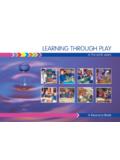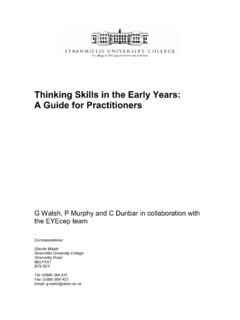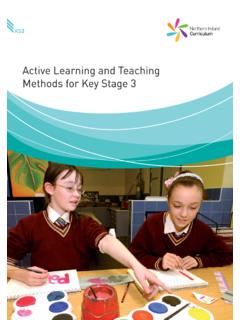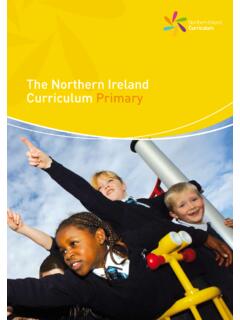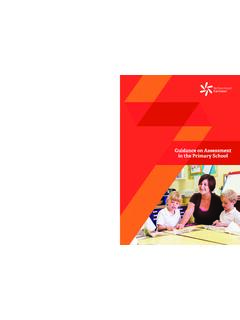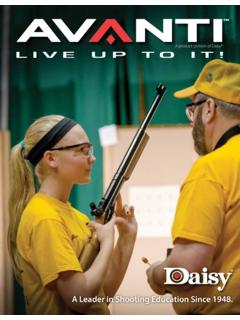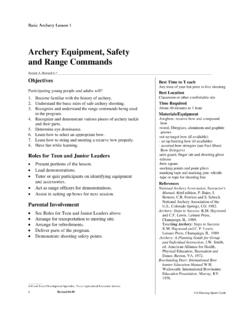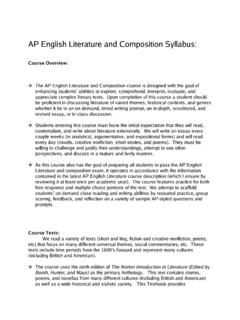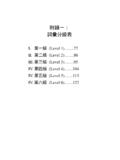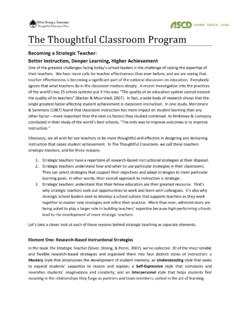Transcription of (PDF) Key Stage 3 Religious Education …
1 REconciliationWorking with DifferenceA Religious Education Resource for Key Stage 3 CONTENTSiINTRODUCTION 01 PREJUDICE SECTION: 03 Minority and Majority groups 04 Inclusion and Exclusion 08 Assumptions, Prejudice and Stereotyping 12 Quiz 16 SECTARIANISM SECTION: 23 Definition of Sectarianism 24 Challenging Sectarianism 1 32 Issues People Face 36 Living Peacefully but Separately 40 Challenging Sectarianism 2 44 reconciliation SECTION: 51 Definition of reconciliation 52 Case Studies 56 The Process of reconciliation 64 Dealing with Difference 66 Prejudice, Sectarianism and reconciliation End Task 72iiACKNOWLEDGEMENTSCCEA WOULD LIKE TO ACKNOWLEDGE THE CO-OPERATION AND SUPPORT OF:Mrs Yvonne Naylor, writerIrish school of EcumenicsRELIGIOUS Education ADVISORY GROUP.
2 Rev Ian Ellis, The Transferors Representative CouncilMrs Bernie Kells, CCEA Ms Linda Colson, CCEAMr Philip Hewitt, Adviser for RE and Learning for Life and Work, NEELBMr John Ferguson, Advisor for RE, SELBFr Declan O Loughlin, Diocesan AdvisorMr Frank Donnelly, Diocesan AdvisorMr Terry McMackin, NICIERev Dr Paul Fleming, St Mary s University CollegeRev Dr Niall Coll, St Mary s University College Mr Norman Richardson, Stranmillis University CollegeProf Rosalind Pritchard, University of UlsterMrs Aideen Hunter, University of Ulster Mr Edwin Graham, The Northern Ireland Inter-Faith ForumMs Paula Graham, Wellington College, BelfastMs Mairead Magill, Edmund Rice College, GlengormleyMrs Brenda Leathem, Drumcree College, PortadownFOCUS GROUP.
3 Ms Pamela Larmour, CCEAMrs Francine Magill, Malone College, BelfastMs Caroline Sullivan, Lagan College, BelfastMr Brendan Dowd, Lagan College, BelfastMs Amanda Willaby, St Dominics High School, BelfastMs Lisa Doherty, St Columb s College, DerryMs Gordana Johnston, Omagh High SchoolMs Orla McCarthy, Little Flower Girls School, BelfastMr Bill Latimer, Advisor for RE, BELBMs Paula Graham, Wellington College, BelfastMs Mairead Magill, Edmund Rice College, Glengormley Northern Ireland has enjoyed over ten years of relative peace.
4 Most Key Stage 3 pupils will have only the faintest memory of living through The Troubles . Their generation is the first in over forty years to grow up in a peaceful society. Unfortunately, the legacy of many years of conflict and division in the province is that we are still faced with the problems of prejudice and sectarianism. The recent arrival of migrant workers, from Eastern Europe and further a field, has also shown the importance of knowing how to deal with people of different backgrounds or resource has been developed to help you address these issues with your class through the context of Religious Education .
5 By looking at the issues through Religious stories and sacred texts, pupils will be encouraged to examine their own attitudes to people from different backgrounds. Religious Education has an important and unique role to play in this by encouraging pupils to develop their beliefs while respecting diversity within society. They will also explore how to start upon, and continue on, the road to reconciliation through Religious stories and sacred texts. The activities and resources have been developed for Year 10 pupils although you may adapt some or all of the materials for an earlier year within the Key Stage .
6 The materials have been developed for pupils in a mainstream setting. As such they will require differentiation for pupils of varying resource includes a number of pupil worksheets that can be put together into a Pupil Journal. Pupils can use these to track their own learning and to help them to contribute to class SYLLABUS FOR Religious EDUCATIONThe teaching of Prejudice, Sectarianism and reconciliation is specified within the Core Syllabus for Religious Education for Key Stage 3, under Learning Objective 3 Morality.
7 This resource outlines ways in which this topic can be taught in schools at Year 10. There are a number of themes within this unit: learning more about identity and relationships with others; assumptions, prejudice and stereotyping; identifying and understanding sectarianism; challenging sectarianism; and understanding reconciliation and dealing with NORTHERN IRELAND CURRICULUMThe Aim of the Northern Ireland Curriculum is: to empower young people to achieve their potential and to make informed and responsible choices and decisions throughout their Area of Learning has a responsibility to work to achieve this aim through the curriculum objectives of developing pupils as: individuals; contributors to society.
8 Contributors to the economy and the Education has an important role to play in this and the teaching of Prejudice, Sectarianismand reconciliation feeds into that role. INTRODUCTION01 This resource supports the curriculum objectives through the Key Elements:LINKS ACROSS THE CURRICULUMW ithin this unit there is a clear link to Local and Global Citizenship, a subject strand of Learningfor Life and Work. You may wish to develop the unit in collaboration with Local and GlobalCitizenship as some activities relate specifically to Citizenship issues.
9 This will help pupils toconnect learning across the with other Areas of Learning could also be made within this unit, for example, English withMedia Education , Art and Design and AND CAPABILITIESThe Northern Ireland Curriculum places an emphasis on the development of Cross-Curricular Skills and Thinking Skills and Personal Capabilities. The activities in this unit aim to help facilitate the development of these skills in the context of Religious Education . Your role in many of the activities is that of facilitator, enabling pupils to take responsibility for their own learning and skills development.
10 ASSESSMENT FOR LEARNINGThe introduction of Assessment for Learning (AfL) strategies can help pupils further develop their skills and capabilities. Learning intentions have been outlined for you in each lesson outline in this resource, and it is recommended that you share these with your pupils and add to them if necessary. Agreeing success criteria with your classes before beginning each unit will also help pupils recognise when they have been successful in their learning. Throughout the resource, there are also many opportunities for self and peer-evaluation.
